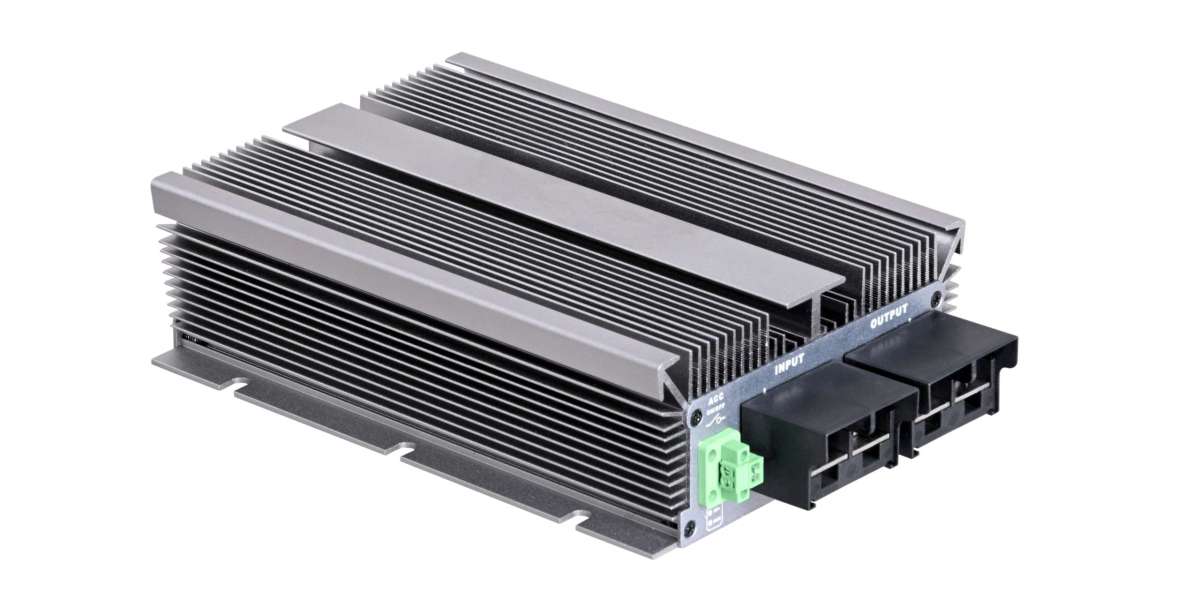When traveling in an RV, one of the key considerations is ensuring that your appliances have a reliable power supply. Whether you are using your RV for short weekend trips or longer off-grid adventures, having the right power management system is essential for comfort and convenience. One crucial component in the RV power system is the DC-DC converter, particularly the RV 150A DC-DC converter for 12V appliances. This article will delve into what an RV 150A DC-DC converter is, how it works, its benefits, and how it plays a pivotal role in enhancing your RV power setup.
What is an RV 150A DC-DC Converter?
An RV 150A DC-DC converter is an electrical device designed to convert the voltage from a higher voltage battery system (such as a 24V or 48V battery) to a 12V DC output. This allows you to run 12V appliances in your RV, such as lights, refrigerators, fans, and other essential devices, even when you're using a higher voltage source, typically found in modern RVs with solar energy systems or dual-battery setups.
The "150A" rating refers to the maximum current the converter can handle, which is 150 amperes. This is a significant current capacity, which means the converter can handle substantial power demands, making it suitable for larger RV systems or those with high energy consumption appliances.
Why Use a DC-DC Converter in an RV?
RV owners who rely on battery-powered systems often face challenges when it comes to managing and distributing power efficiently. Converters play a critical role in ensuring that various electrical systems within the RV work seamlessly without risking overloading or damaging components. Here are a few reasons why an RV 150A DC-DC converter is indispensable:
1. Optimizing Power Efficiency
An RV 150A DC-DC converter is designed to convert the power at a highly efficient rate, minimizing energy loss during the conversion process. Without a DC-DC converter, RV owners would have to rely on direct connections from a higher-voltage battery to 12V appliances, leading to potential inefficiencies, voltage drops, and even damage to sensitive electronics. The converter ensures that power is delivered in the optimal range for 12V appliances, maximizing overall energy efficiency.
2. Ensuring Safe Operation of 12V Appliances
DC-DC converters protect the appliances from potential damage caused by voltage fluctuations. Since most RVs use either 24V or 48V battery systems, the conversion to 12V is necessary to ensure that appliances which are designed for 12V DC can operate safely without being exposed to higher voltage levels. The converter acts as a voltage regulator, maintaining a constant and safe voltage output.
3. Enabling Off-Grid Adventures
One of the biggest advantages of RVing is the ability to travel off the beaten path. For long-term off-grid RV adventures, a reliable power source is necessary, especially if you are using solar panels or a dual-battery system. The RV 150A DC-DC converter allows the use of higher voltage sources to power 12V appliances, making it an essential component in off-grid setups. This ensures that your 12V systems, such as lighting and refrigeration, remain functional even when you’re far from a power source.
4. Supporting Larger Systems with High Current Demands
The 150A current capacity is a key feature of this DC-DC converter. It allows the converter to power larger systems or appliances that require higher current. For example, if you have a large RV fridge, a high-power fan, or other energy-hungry devices, a 150A DC-DC converter can handle these demands without issues, providing a stable power supply to multiple 12V appliances simultaneously.
How Does an RV 150A DC-DC Converter Work?
The primary function of an RV DC-DC converter is to step down the voltage from a higher DC source (such as a 24V or 48V battery) to a stable 12V output. This process involves several key steps:
1. Input Power
The DC-DC converter receives DC power from a higher voltage source, often a 24V or 48V battery bank or even a solar system. In an RV, a dual-battery setup is quite common, and the converter uses this higher voltage to power 12V appliances.
2. Conversion Process
The core technology in a DC-DC converter is the switching regulator. It works by rapidly switching the input voltage on and off, filtering the signal, and then adjusting it to the desired 12V output. The high-frequency switching and voltage control are done using inductors and capacitors that regulate the output voltage effectively and efficiently.
3. Output Power
The final result is a steady 12V output, which can be used to power various RV appliances like lights, water pumps, refrigerators, and more. The converter ensures that the power remains consistent, allowing your appliances to operate without interruption, even when the input voltage fluctuates.
Benefits of the RV 150A DC-DC Converter
There are several key benefits of using an RV 150A DC-DC converter for your 12V appliances, especially for RV owners who rely on battery systems or renewable energy sources. Here are some of the most important advantages:
1. Efficiency in Power Conversion
DC-DC converters are highly efficient at converting power without generating much heat. This is particularly important in RV systems where space is limited and excessive heat generation could damage other components. A typical RV 150A DC-DC converter operates at an efficiency of 90% or higher, ensuring that most of the energy from the source battery is effectively used to power your appliances.
2. Versatility for Off-Grid Systems
As mentioned, RV 150A DC-DC converters are ideal for off-grid applications. Whether you're using solar panels, wind turbines, or a generator to charge your RV's higher-voltage battery bank, the converter ensures that your 12V appliances continue to work even when you're far from traditional power sources. The ability to utilize renewable energy sources such as solar for 12V appliances is one of the key selling points of DC-DC converters in RVs.
3. Better Battery Management
By ensuring efficient voltage conversion, the RV 150A DC-DC converter also helps in managing the battery's life. It helps reduce overcharging or undercharging, which can damage the battery. By providing a stable voltage to 12V appliances, the converter allows your battery to last longer, giving you more use from each charge.
4. Compact and Space-Saving Design
The design of the RV 150A DC-DC converter is typically compact, making it easy to install even in small RV spaces. With RVs often being limited on space, it is crucial to have energy conversion solutions that are not only efficient but also space-saving. The small size of the converter allows it to fit neatly in a corner or compartment without taking up valuable storage space.
5. Protecting Appliances
In an RV, where you might be dealing with fluctuating power sources, the DC-DC converter plays a crucial role in ensuring that the 12V appliances are protected from any spikes or drops in voltage. By regulating the output voltage, it helps extend the lifespan of sensitive electronics and appliances, ensuring they continue to function smoothly throughout your travels.
Applications of the RV 150A DC-DC Converter
The RV 150A DC-DC converter is ideal for various power applications within an RV, especially for owners who want to maximize the efficiency of their energy systems. Some of the most common applications include:
1. Lighting Systems
Most RVs use 12V lighting systems, and the DC-DC converter ensures that the lights receive stable and consistent power, even if the main power source operates at a higher voltage.
2. Refrigeration
Many RVs are equipped with 12V DC refrigerators, and the converter ensures that these systems receive the necessary voltage to maintain cooling without any fluctuations that could impact performance.
3. Water Pumps
RV water pumps, which are typically 12V, rely on a steady supply of power. The DC-DC converter helps maintain this steady power, ensuring that your water system operates smoothly while conserving energy from the RV's battery bank.
4. Fans and Other Appliances
From exhaust fans to small appliances like TVs and radios, the RV 150A DC-DC converter helps ensure that these devices receive consistent 12V power, regardless of the fluctuations in the overall system voltage.
Conclusion
The RV 150A DC-DC converter for 12V appliances is an essential component for RV owners who want to ensure efficient power conversion and distribution in their vehicles. By providing a stable 12V output from higher-voltage systems, it allows for seamless operation of essential appliances and ensures energy efficiency in off-grid scenarios. Whether you are using solar, dual batteries, or other renewable sources, a DC-DC converter helps optimize energy use, extend battery life, and protect sensitive appliances. In summary, it is a powerful and reliable solution for anyone looking to enhance their RV power system for extended comfort and convenience on the road.





